|
|
|
Sort Order |
|
|
|
Items / Page
|
|
|
|
|
|
|
| Srl | Item |
| 1 |
ID:
152078
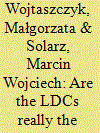

|
|
|
|
|
| Summary/Abstract |
The term ‘the least developed countries’ (LDCs) is widely understood to designate, exactly as stated, the world’s least developed countries. In conjunction with the 2015 United Nations (UN) triennial review of the LDC category, this article attempts to critically evaluate the UN’s list of LDC countries in the light of various indicators – economic, social, political, military and security related, and psychological. It concludes that the official and actual lists of LDCs, despite important similarities, are not completely identical. The term ‘the LDCs’ as used by the UN is therefore not fully consistent with the reality it attempts to designate and describe.
|
|
|
|
|
|
|
|
|
|
|
|
|
|
|
|
| 2 |
ID:
177774


|
|
|
|
|
| Summary/Abstract |
The Novel Corona Virus (COVID-19) has created tremendous negative impacts on the livelihood of the marginal population in Bangladesh. Many people working in the informal sector have lost their job and income due to the ongoing pandemic. Unemployment and poverty among the people in both urban and rural areas throughout the country have increased. The success in economic growth in the last few decades could not save poor people to become extreme poor because economic prosperity was not inclusive in Bangladesh. This study tries to identify some of the impacts that COVID-19 has imposed on the lives of marginal population. Then it indicates some of the serious limitations of the existing economic policies. This article suggests that only growth-oriented policy measures are not sufficient to reconstruct the economy in the post-COVID era. Rather Bangladesh needs to adopt employment-oriented economic policies that are capable to create more jobs and reduce poverty and inequality.
|
|
|
|
|
|
|
|
|
|
|
|
|
|
|
|
| 3 |
ID:
154078
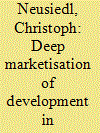

|
|
|
|
|
| Summary/Abstract |
This article introduces the concept of ‘deep marketisation’ as a relatively new, contemporary phase of neoliberal development policy in Bangladesh. By looking into the development strategy of the country’s energy sector, the article shows how an emphasis on marketisation through public-private partnerships (PPPs) and other strategies advances a market fundamentalist agenda to strengthen the private sector and establish a world market. By drawing on interviews with development practitioners from various development organisations in Bangladesh, the article further reveals how development conceptualisations are shaped by the strategy of deep marketisation, leading to the impoverishment of development by constraining its field of actions to measures based on the primacy of economic growth and private sector-led economic development, at the same time leading to a re-legitimisation of flawed neoliberal development policies that result in further inequality, poverty and environmental degradation.
|
|
|
|
|
|
|
|
|
|
|
|
|
|
|
|
| 4 |
ID:
140962
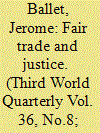

|
|
|
|
|
| Summary/Abstract |
In this article we first point out that the different conceptualisations of Fair Trade, which are sometimes analytically contradictory, actually form a coordinated set. Understanding the Fair Trade project is impossible without taking these interlinked conceptualisations into consideration. Second, this set basically forms a mechanism of structural, institutional and moral reforms that guide actions. In this way Fair Trade sets out to produce less injustice than is usually the case with the structures and institutions that govern conventional trade. Nevertheless, it does not try to define what a just society is or even to perfectly define ‘fair trade’. This implies the adoption of a comparative justice angle. It is precisely by linking comparative individual situations with the structures that produce these situations that relative justice can find its strength and purpose.
|
|
|
|
|
|
|
|
|
|
|
|
|
|
|
|
| 5 |
ID:
141891
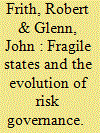

|
|
|
|
|
| Summary/Abstract |
Following the plane crashes into the twin towers of the World Trade Centre, Ulrich Beck claimed that the West would need to pursue ‘border-transcending new beginnings’ towards a more cosmopolitan world. Rather than any radical transformation along cosmopolitan lines, however, this paper maps a process of incremental reform and policy bricolage, where the post-cold war politics of intervention, and the securitisation of development, have been extended to encompass international terrorism in three overlapping phases. Although these overlapping phases – intervention, prevention and extension – are reflexive moments, they constitute a strengthening of the prevailing rationalities and technologies of risk rather than a radical rupture.
|
|
|
|
|
|
|
|
|
|
|
|
|
|
|
|
| 6 |
ID:
153143
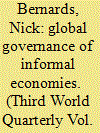

|
|
|
|
|
| Summary/Abstract |
This article develops a Gramscian approach to the governance of ‘informal’ economies through a historical study of International Labour Organization (ILO) programmes in East Africa. Drawing on Gramsci’s conception of the ‘subaltern’, the article highlights the ways in which the articulation of ‘informality’ in policy documents is coloured by broader struggles over the political organisation of labour. The article develops this argument through two case studies. The first examines the World Employment Programme mission to Kenya in the 1970s that popularised the concept of ‘informal’ labour. The second is a contemporary programme on apprenticeships in the informal economy that originated in Tanzania.
|
|
|
|
|
|
|
|
|
|
|
|
|
|
|
|
| 7 |
ID:
158917


|
|
|
|
|
| Summary/Abstract |
The level of, and trends in, global inequality and global poverty are indicative assessments of who has benefited from economic growth. The revision of price data has led to a reassessment of those estimates. Through an extensive overview of the implications, we argue that the data can be read in different ways. Official estimates show global extreme poverty and global inequality are considerably lower than previously thought. We argue that these changes are much less significant than they at first appear, and we present a more nuanced alternative interpretation by exploring changes across the entire global distribution.
|
|
|
|
|
|
|
|
|
|
|
|
|
|
|
|
| 8 |
ID:
142654
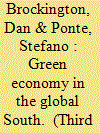

|
|
|
|
|
| Summary/Abstract |
As multiple visions for a Green Economy seek to become real, so are green economic initiatives in the global South multiplying. These can offer integration into wealth-generating markets – as well as displacement, alienation, conflict and opportunities for ‘green washing’. The articles included in this collection bring together a multidisciplinary team of scholars and a range of case studies, from forestry governance to tourism to carbon finance, to provide nuanced analyses of Green Economy experiences in the global South – examining the opportunities they provide, the redistributions they entail and the kinds of resistance they face.
|
|
|
|
|
|
|
|
|
|
|
|
|
|
|
|
| 9 |
ID:
141893


|
|
|
|
|
| Summary/Abstract |
The EU has loudly voiced its intention to facilitate poverty reduction and democratisation in North Africa. In particular, it seeks to conclude Deep and Comprehensive Free Trade Agreements (DCFTAs) with Tunisia, Morocco and Egypt. These are seen as a vital response to the Arab Spring – integrating North African countries into the globalised economy. Applying a moral economy perspective, this article argues, however, that, while ‘Normative Power Europe’ seeks to build more tranquil societies in the region, its trade policies nevertheless threaten to exacerbate poverty and social unrest. The prospect of de-industrialisation in the wake of FTAs will do much to entrench economic asymmetries between the European metropole and its neighbours.
|
|
|
|
|
|
|
|
|
|
|
|
|
|
|
|
| 10 |
ID:
144275
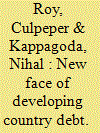

|
|
|
|
|
| Summary/Abstract |
Developing country debt has been a major preoccupation for development policy makers and practitioners since the debt crisis of 1982. It is a major obstacle to economic and social progress in developing countries. After the resolution of the Asian financial crisis of the late 1990s and the debt relief initiatives for low-income countries of 1997–2006 concerns about developing country debt seem to have receded. However, there are a growing number of problems that warrant concern, including the accumulation of domestic debt, short-term debt and private non-guaranteed debt, and increasing recourse by low-income countries to international capital markets. At the same time developing countries have strengthened their capacity to oversee and analyse their debt portfolios. Nonetheless, significant weaknesses remain in debt management capacity at the national level. Moreover, the activities of ‘vulture funds’ and the lack of a sovereign debt restructuring mechanism reveal major shortcomings in the international institutional architecture that need to be addressed urgently.
|
|
|
|
|
|
|
|
|
|
|
|
|
|
|
|
| 11 |
ID:
165072
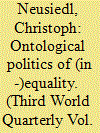

|
|
|
|
|
| Summary/Abstract |
This article aims to add a new line of research to the post-development school of thought. Drawing on the many evident yet rarely noticed parallels between post-development and (post-)anarchism, I develop an understanding of ‘anarchistic post-development’ as a politics based on what French philosopher Jacques Rancière calls ‘the presupposition of equality’. I further connect this with Arturo Escobar and Marisol De la Cadena’s concept of political ontology, suggesting that we can make sense of and analyse both contemporary ‘Development’ projects as well as anarchistic post-developmental ‘alternatives to Development’ through the lens of what I call ‘the ontological politics of (in-)equality’. To substantiate my points, I will draw on the recent case of a Mâori tribe who won a historical legal battle to declare the Whanganui River a living entity.
|
|
|
|
|
|
|
|
|
|
|
|
|
|
|
|
| 12 |
ID:
151500
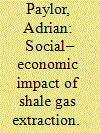

|
|
|
|
|
| Summary/Abstract |
This article explores the global social–economic impact of shale gas extraction, comparing the differing social and economic impacts shale gas extraction may have on communities in developed and developing countries. It argues that the benefits of fracking are more likely to be enjoyed by communities in highly and very highly developed countries rather than by those in countries with low or medium levels of development . Additionally, it shows that the potential risks and drawbacks of shale gas and its extraction are more likely to be experienced by communities in these latter countries than by those in highly or very highly developed countries. However, it also demonstrates that even communities in developed countries are vulnerable to environmental and health risks associated with shale gas extraction.
|
|
|
|
|
|
|
|
|
|
|
|
|
|
|
|
|
|
|
|
|